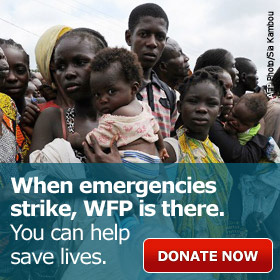| 85 Million Children Receive School Meals in Latin America and the Caribbean World Food Programme | |
| go to original October 18, 2014 |
|
 |
MEXICO CITY – The 6th Latin American and Caribbean School Feeding Seminar this week saw 200 participants exchange experiences to determine how school feeding programs can improve their impact and efficiency, especially among people who are exposed to economic crisis or other shocks.
The event, titled “Towards Strengthening a Safe and Healthy School Feeding” is sponsored by the System for the Integral Development of Families in Mexico City (DIF CDMX) with the support of the World Food Programme (WFP) and of the Latin America and the Caribbean School Feeding Network (La-RAE).
According to WFP data, school feeding programs are widely implemented by governments of the region with an annual investment of approximately US$4,3 billion to provide school meals to around 85 million children. Meanwhile WFP supports school feeding activities in 12 countries, assisting 2.1 million children in partnership with governments to make this programs more efficient, effective and sustainable.
“Primary school enrollment rates are impressively high in Latin America and the Caribbean, which reaches 94% of the children. School feeding helps to increase enrollment and to reduce dropout rates while promoting gender equality because it allows girls and boys to access education,” said WFP Regional Director for Latin America and the Caribbean, Miguel Barreto.
The event gathered some 200 representatives from 18 governments, public and private institutions, as well as national and international high-level experts in the field of school feeding. The participants will exchange experiences to determine how school feeding programs can improve their impact and efficiency, especially among people who are exposed to economic crisis or other shocks.
Besides education, school feeding programs also offer a wide range of benefits related to health, nutrition and family income objectives as established by the UN Secretary General’s Zero Hunger Challenge.
According to Barreto, this seminar contributes not only to plan the public policy national agendas, but also the international agenda for sustainable development which is based on a vision and all countries’ joint effort to achieve Zero Hunger.
“WFP is increasingly focused on helping countries to establish and maintain programs linked to local agricultural production, with the aim of supporting smallholder farmers through institutional purchases, ensuring a more healthy and diverse nutrition which respects local food habits,” said Barreto. For example, smallholder farmers in Central America who participate in the Purchase for Progress initiative (P4P) sold 26,368 Metric Tons of food, worth US$17 million, to the school feeding programs .
“It is paramount for this region to keep investing and strengthening its school feeding programs to safeguard the progress achieved, and because there is still work to do,” said the WFP Regional Director. “It is a wise investment in the present and future of children, and therefore, in our countries’ development,” he said.
Among the topics covered in the sessions are: malnutrition among school children, the link between school feeding programs and family agriculture – to observe World Food Day -, the promotion of partnerships for the joint development of school feeding programs, and South-South cooperation to support school feeding.
During 2013, WFP provided school meals to 19,8 million children in 63 countries.
WFP is the world's largest humanitarian agency fighting hunger worldwide, delivering food in emergencies and working with communities to build resilience. In 2013, WFP assisted more than 80 million people in 75 countries.
See the original at World Food Programme
We invite you to add your charity or supporting organizations' news stories and coming events to PVAngels so we can share them with the world. Do it now!
Celebrate a Healthy Lifestyle
 From activities like hiking, swimming, bike riding and yoga, to restaurants offering healthy menus, Vallarta-Nayarit is the ideal place to continue - or start - your healthy lifestyle routine.
From activities like hiking, swimming, bike riding and yoga, to restaurants offering healthy menus, Vallarta-Nayarit is the ideal place to continue - or start - your healthy lifestyle routine.